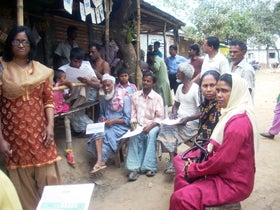 Under the Bangladesh Local Governance program, social audits are being conducted in Union Parishads (UPs) for strengthening social contract between the citizens and their local governments. A weekly TV program "Amader Union" or Our Union was launched by TV Journalist Shykh Seraj, who is documenting and broadcasting these social audits. This is generating lot of interest among both rural and urban citizens. The UP functionaries are also keen to participate in these social audits, so as to showcase their good work and responsiveness to citizens.
Under the Bangladesh Local Governance program, social audits are being conducted in Union Parishads (UPs) for strengthening social contract between the citizens and their local governments. A weekly TV program "Amader Union" or Our Union was launched by TV Journalist Shykh Seraj, who is documenting and broadcasting these social audits. This is generating lot of interest among both rural and urban citizens. The UP functionaries are also keen to participate in these social audits, so as to showcase their good work and responsiveness to citizens.
I observed a social audit in March 2011 on a LGSP scheme (a 350 feet rural road with brick-soiling in Sarabo Mouza, Kashimpur UP, Gazipur district) conducted by the citizen group (CG). The CG conducted a social audit at the local market by this road. The CG put a large poster detailing the Community Score card (CSC), that had questions and possible responses indicated by symbols. Symbols were used as a large number of rural poor are illiterate. The scores are given over a total number of 100, so that people can distinguish bad performance (below 40%), medium (60%) and good (80% or more).
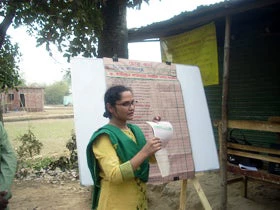
Before, they used to walk in knee-deep mud, and could not come to market. After this road was built, even trucks are able to come and market is bustling with activities. The community gave low score on participation, as many of them were not consulted before this scheme was taken. Mr. Hazrat Ali, a former UP member pointed out that there is another road nearby that is worse and should have been rehabilitated first.
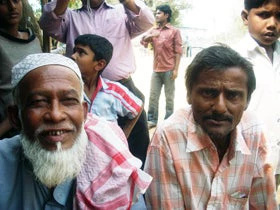
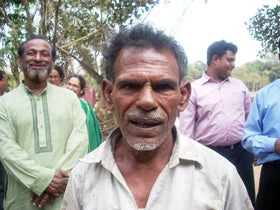
The UP functionaries were frank in their opinion on where they did well and what the challenges are. Many UPs acknowledge the challenge of undertaking consultation and community participation in decision making, especially when time is short and schemes have to be completed and funds spent before the end of the fiscal year. The poor citizens are also busy during crop planting and harvesting seasons. The opportunity cost of participation may be high for the poor, who has to work daily for subsistence.
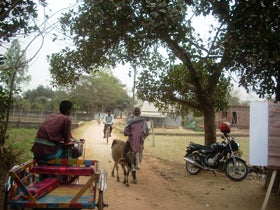 The baseline data of LGSP indicate that nearly 80% of the UP citizens know about UP open budget meetings, but only 15-20% participates. The communities are not sure whether their participation in UP meetings will improve local development or their own benefits. As result, they do not have incentive to participate in the local governance process. However, the social audit, interface meeting with UP and agreement on the social contract made the communities of Kashimpur UP hopeful that their participation and collective action can help bring benefit to the most marginalized and poor. Communities felt that the social contract between the UPs and communities, and regular monitoring by the CG and themselves is a way forward for deeper civic engagement and mutual accountability between the citizens and their governments.
The baseline data of LGSP indicate that nearly 80% of the UP citizens know about UP open budget meetings, but only 15-20% participates. The communities are not sure whether their participation in UP meetings will improve local development or their own benefits. As result, they do not have incentive to participate in the local governance process. However, the social audit, interface meeting with UP and agreement on the social contract made the communities of Kashimpur UP hopeful that their participation and collective action can help bring benefit to the most marginalized and poor. Communities felt that the social contract between the UPs and communities, and regular monitoring by the CG and themselves is a way forward for deeper civic engagement and mutual accountability between the citizens and their governments.


Join the Conversation